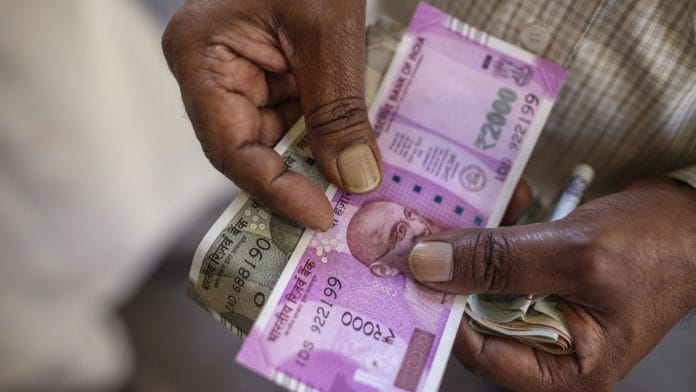Mumbai: India’s rupee halted a seven-day rally and bonds declined after a drone attack on Saudi Arabia’s oil facilities sent global crude prices soaring by the most on record.
The currency fell 0.8% to 71.48 per dollar and the benchmark 2029 bond yields rose six basis points to 6.70%. The S&P BSE Sensex gauge of equities declined 0.7%.
India buys more than two-thirds of its oil, mostly from the Middle East, making it one of the most vulnerable in the region to a surge in oil prices. The spike come even as benign inflation and a slowing economy has led traders to bet the central bank will add to four rate cuts this year at its meeting in October.
“If crude prices stay up, the Reserve Bank of India may not be able to deliver more than 25 basis points of cuts,” said Naveen Singh, head of fixed-income trading at ICICI Securities Primary Dealership Ltd. in Mumbai.
The increased geopolitical risk concerns overshadowed the measures Finance Minister Nirmala Sitharaman announced over the weekend to revive economic growth from a six-year low. The government’s third set of steps in four week include a tax refund program for exporters and a funding window for affordable housing to revive stalled projects.
Brent soared 10% and crude traded in New York added 9% after the world’s largest oil exporter lost about 5.7 million barrels a day of output following the attack. It is the single worst sudden disruption ever, surpassing the loss of Kuwaiti and Iraqi petroleum supply in August 1990, when Saddam Hussein invaded his neighbor.
Also read: How Modi govt will turn used cooking oil into biodiesel to cut oil imports
Fund Flows
The shock comes when sentiment remains fragile in India’s $1.9 trillion stock market. While equities appear to have found a floor after suffering the worst three-month period since 2016, as foreigners turned net buyers last week, a series of steps by authorities to revive the economy have failed to spur a sustainable rally.
Global funds have pulled $4.5 billion from shares in the current quarter, and a weak rupee typically leads to a vicious cycle of capital outflows.
“Current-account deficit economies, which are oil importers, will fare worst,” said Khoon Goh, the Singapore-based head of Asia research at Australia & New Zealand Banking Group. “In this regard, INR, IDR and PHP are likely to underperform. USD/INR, after having fallen below 71 last week, is likely to test 72 again if oil prices stay elevated.”
Also read: US move on Iran oil sanctions is a win-win situation for Saudi Arabia







At some stage, the RBI will feel the need to raise rates, to protect the rupee.